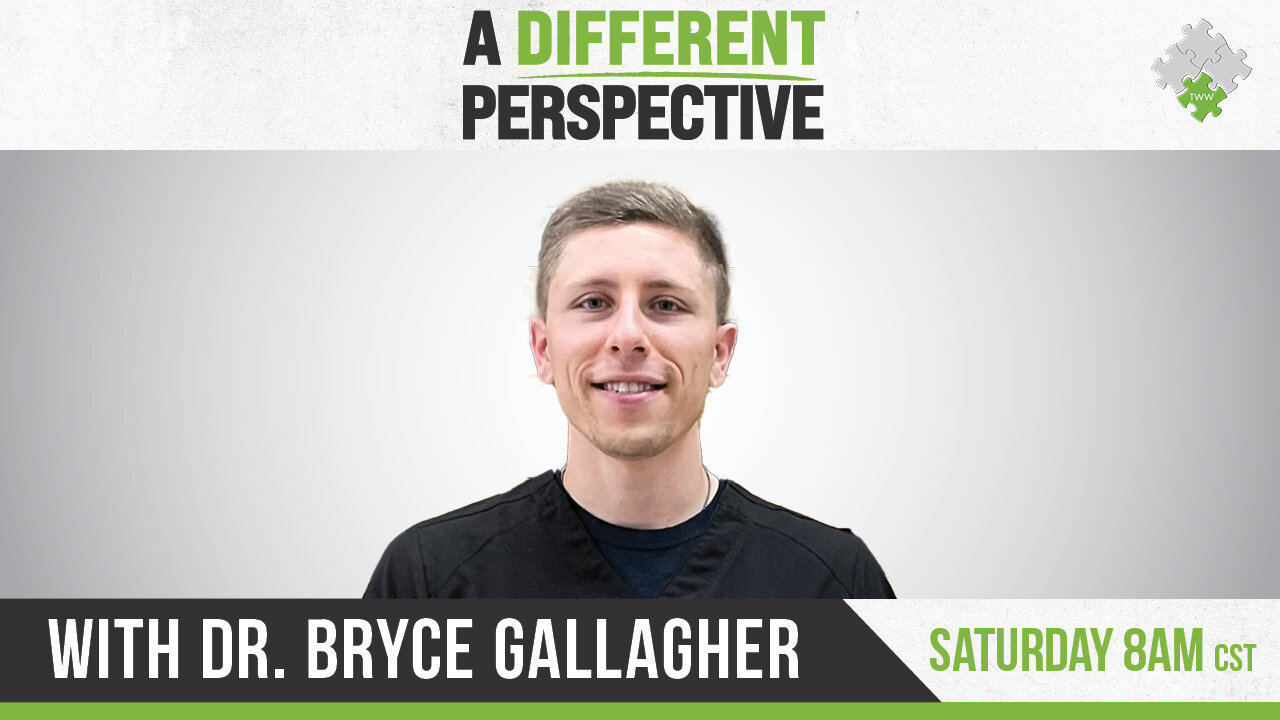Premium Only Content

Menopause: Weight Loss When Nothing Works | A Different Perspective | Feb 3, 2024
A lot of women have trouble losing weight after menopause. This struggle can get frustrating when you feel like you’ve tried everything, and yet the weight refuses to leave. This week, on A Different Perspective, Dr. Bryce Gallagher covers the post-menopausal weight loss struggle. Dr. Bryce goes into what menopause is, symptoms like vaginal dryness, hot flashes, and thinning hair. He also explains the effects all this has on the weight loss question.
Some of the topics covered include:
• The correlation between adrenal glands and menopausal weight loss
• Stress – why it has a different impact now than it used to
• The building blocks your body needs to thrive.
• Next steps
Dr. Bryce also discusses the supplement ashwagandha. He breaks down the benefits and science behind it so that his viewers better understand when and why they’re suggested.
Get the full explanation and advice on how to set your body up for success – watch now!
And join us on Saturdays at 8 AM Central on our website (https://www.thewellnessway.com/adp/), Instagram, Facebook, or X to engage with some of our docs and get your health questions answered!
For further information, check out these articles:
https://www.thewellnessway.com/menopause-doesnt-have-to-be-miserable-heres-how-to-transition-smoothly/
https://www.thewellnessway.com/is-perimenopause-real/
https://www.thewellnessway.com/relieving-hot-flashes-naturally/
https://www.thewellnessway.com/adrenal-fatigue-when-coffee-stops-working/
Articles cited in this video:
https://www.mayoclinic.org/diseases-conditions/menopause/symptoms-causes/syc-20353397
https://www.canceraustralia.gov.au/cancer-types/breast-cancer/treatment/menopause-and-oestrogen-production
https://pubmed.ncbi.nlm.nih.gov/32999709/
https://pubmed.ncbi.nlm.nih.gov/31517876/
https://www.thewellnessway.com/adp/the-hidden-dangers-of-sugar-on-body-function/
https://www.ncbi.nlm.nih.gov/pmc/articles/PMC3252722/
Menopause and weight loss
• What is it
o Menopause is the time that marks the end of your menstrual cycles. It's diagnosed after you've gone 12 months without a menstrual period. Menopause can happen in your 40s or 50s, but the average age is 51 in the United States.
Menopause is a natural biological process. But the physical symptoms, such as hot flashes, and emotional symptoms of menopause may disrupt your sleep, lower your energy or affect emotional health. There are many effective treatments available, from lifestyle adjustments to hormone therapy. (Mayo Clinic)
• Symptoms
o In the months or years leading up to menopause (perimenopause), you might experience these signs and symptoms:
▪ Irregular periods
▪ Vaginal dryness
▪ Hot flashes
▪ Chills
▪ Night sweats
▪ Sleep problems
▪ Mood changes
▪ Weight gain and slowed metabolism
▪ Thinning hair and dry skin
▪ Loss of breast fullness (Mayo Clinic)
• Menopause and estrogen production
o All women produce the female hormone estrogen; however, it's made differently by the body before and after menopause. Before menopause (pre-menopause) estrogen is made mainly by the ovaries.
Around the time of menopause (peri-menopause), the ovaries stop making female hormones, including estrogen. This usually happens when women are in their late 40's and early 50's. Symptoms of menopause include irregular menstrual cycles, hot flushes and sleep disturbances.
After menopause (post-menopause), monthly menstrual periods stop. The body still makes small amounts of ostrogen by changing hormones called androgens into estrogen. Androgens are produced by the adrenal glands, which are above the kidneys. A hormone called aromatase changes androgens into estrogen. Aromatase is produced mainly by fatty tissue. (Cancer Australia)
• Obesity, estrogens, and adipose tissue dysfunction
o Adipose-derived estrogens and PAH
▪ Estrogens are steroid hormones and play key role in the development of secondary sex characteristics. They are also important in regulating memory and bone density and have been shown to have cardiovascular effects. The three major estrogens are estrone, estradiol and estriol.
Premenopause, estrogen synthesis occurs mainly in the ovarian follicles and corpus luteum. In postmenopausal women and in men, estrogen is instead produced by extragonadal sites including adipose tissue where it acts locally in a paracrine fashion or can be released into the circulation.
After menopause, adipose tissue is the primary source of estrogen production in the body. (NIH)
• Breast cancer increasing in men
• Stress and adrenals
o Food
o Emotional
o Stress is stress
▪ Body doesn’t recognize difference; its goal is to keep you alive
o When your body is stressed, body holds onto fat to produce needed hormones.
• How do you look at these?
o Need the right building blocks
o Adrenal gland function
▪ DHEA: Produced in the adrenal glands. Can convert into testosterone or estradiol. Acts as a neuro-steroid and plays a role in the Central Nervous System.
▪ Cortisol: Produced by the adrenal glands.
• Plays a role in the immune system, bodies response to stress, blood sugar regulation, and more!
▪ But what else?
• DHEA
• Cortisol
o Blood sugar
o Waking up at 2-3 in the morning – adrenal glands are spiking
o Dutch test
▪ Patterns
▪ Androgens
▪ Cancer risk
▪ Where is the hormone going?
o Let go of stress, and feel the benefits
▪ Kidney
▪ Liver
• And more
• Ashwagandha
o Encourage healthy response to environmental stress
o Promote overall feeling of well-being
o Support the body as it ages
o Longevity
▪ An investigation into the stress-relieving and pharmacological actions of an ashwagandha (Withania somnifera) extract (NIH)
• Stress is a general term defined as the nonspecific response of the body to any demand for change. (12) It is a major exacerbating factor for both hypertension and diabetes which are major killers worldwide. 3-15] High stress is also a common trigger for mood disorders such as anxiety and depression.16.12] As an agent to modulate stress and anxiety, ashwagandha has been investigated in several human trials. In 2, double-blind, placebo-controlled studies, ashwagandha was associated with greater reductions in anxiety in adults presenting with predominately generalized anxiety disorder U8.19] In an 8-week, randomized, double-blind, placebo-controlled study ashwagandha was associated with greater reductions in anxiety, morning cortisol, c-reactive protein, pulse rate, and blood pressure in chronically stressed adults. (20) Greater increases in serum dehydroepiandrosterone sulfate (DHEA-S) and hemoglobin were also noted. Further randomized, double-blind, placebo-controlled studies have confirmed ashwagandha's anti-stress and cortisol-lowering effects in adults with self-reported chronic stress (21] and chronically stressed overweight and obese adults.(22] In all these studies ashwagandha was well tolerated with minimal adverse effects reported.
o CRP – inflammation markers, weight loss
▪ Bryce’s previous video
o An increase of CRP can lead to an increase of weight
▪ Ashwagandha can lower that
• Last paragraph of study, starting with “serum”
▪ An Overview on Ashwagandha: A Rasayana (Rejuvenator) of Ayurveda (NIH)
• Ashwagandha is commonly available as a churna, a fine sieved powder that can be mixed with water, ghee (clarified butter) or honey. It enhances the function of the brain and nervous system and improves the memory. It improves the function of the reproductive system promoting a healthy sexual and reproductive balance. Being a powerful adaptogen, it enhances the body's resilience to stress. Ashwagandha improves the body's defense against disease by improving the cell-mediated immunity. It also possesses potent antioxidant properties that help protect against cellular damage caused by free radicals.
• Your body heals, all it needs is to not be overwhelmed by stress, and to have the needed building blocks.
• Steps to lose weight in menopause
o Support adrenal glands
o Manage stress
▪ Stress happens – support it
o Eat more protein and less carbs
▪ Link to Doc’s video
▪ At least 100g protein/day. If not 120g.
▪ We don’t come from nothing – have to fuel body with the right things
▪ People eat a lot, don’t get enough nutrients, and end up with toxic bodies.
Videos on Finding Answers to Your Health Challenges:
https://www.youtube.com/@UCuBXr4h8_9KCHkjVy0k2xIg
I will answer your health questions, please leave a comment or email me:
pflynn@thewellnessway.com
Take advantage of a free consultation with one of our Doctors!
https://www.thewellnessway.com/consult-a-doctor/
Find a Wellness Way Clinic near you:
https://www.thewellnessway.com/clinics/
Dr. Patrick Flynn Bio:
Dr. Patrick Flynn is a chiropractor, international speaker, best-selling author, and the founder of The Wellness Way. He is on a mission to revolutionize the approach to health by empowering people to take control of their health and transform their lives. Dr. Patrick challenges the traditional approach to health by having tough but necessary conversations about medical, political, and personal issues related to health.
Follow Me On Social Media:
Facebook: https://www.facebook.com/drpatrickflynn
Instagram: https://www.instagram.com/drpatrickflynn/
TikTok: https://www.tiktok.com/@dr..patrick.flynndc
Disclaimer:
Dr. Patrick Flynn is a licensed chiropractor and practices in Wisconsin. This video is for general informational purposes only. It should not be used to self-diagnose and it is not a substitute for a medical exam, cure, treatment, diagnosis, prescription, or recommendation. It does not create a doctor-patient relationship between Dr. Patrick Flynn and you. You should not make any change in your health regimen or diet before first consulting a physician and obtaining a medical exam, diagnosis, and recommendation. Always seek the advice of a physician or other qualified health provider with any questions you may have regarding a medical condition.
#weightloss #journey #education
Thanks for watching! Stay tuned for the next video.
-
 1:28:32
1:28:32
A Different Perspective
1 month ago $0.03 earnedThe Connection Between Healthcare and Politics - and Why You Should Care
911 -
 34:12
34:12
inspirePlay
1 day ago $4.94 earned🏆 The Grid Championship 2024 – Cass Meyer vs. Kelly Rudney | Epic Battle for Long Drive Glory!
71K8 -
 17:50
17:50
BlackDiamondGunsandGear
11 hours ago $1.70 earnedTeach Me How to Build an AR-15
46.1K6 -
 9:11
9:11
Space Ice
1 day agoFatman - Greatest Santa Claus Fighting Hitmen Movie Of Mel Gibson's Career - Best Movie Ever
107K45 -
 42:38
42:38
Brewzle
1 day agoI Spent Too Much Money Bourbon Hunting In Kentucky
71.3K12 -
 1:15:30
1:15:30
World Nomac
20 hours agoMY FIRST DAY BACK in Manila Philippines 🇵🇭
54.6K9 -
 13:19
13:19
Dr David Jockers
1 day ago $10.68 earned5 Dangerous Food Ingredients That Drive Inflammation
74.4K17 -
 1:05:13
1:05:13
FamilyFriendlyGaming
1 day ago $15.71 earnedCat Quest III Episode 8
128K3 -
 10:39
10:39
Cooking with Gruel
2 days agoMastering a Succulent London Broil
82.3K5 -
 22:15
22:15
barstoolsports
1 day agoWhite Elephant Sends Barstool Office into Chaos | VIVA TV
57.9K1